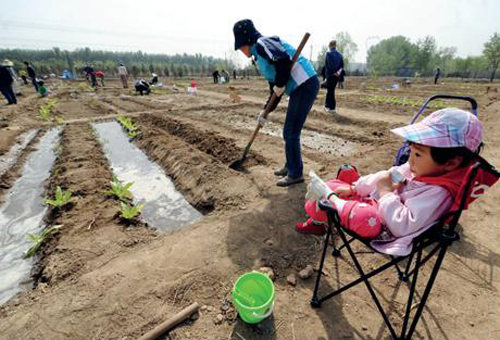|
 |
|
FAMILY TIME: A mom works in the farmland of the Little Donkey Farm as her daughter looks on in Beijing's suburb on April 16, 2011. The farm encourages consumers to rent its land and do farm work themselves (LUO XIAOGUANG) |
Neatly-packaged vegetables and fruits greet customers at the entrance of the Ganbei Supermarket in Beijing's Xicheng District. The produce, usually sold in small plastic boxes, looks fresh and clean. Some boxes bear organic certification marks and some do not.
Hanging from the top of a shelf are the organic certificates of a vegetable producer in Xiaotangshan in Beijing's north suburb. The certificates list the vegetable varieties certified and their planting acreage.
But Yan, a woman in her 70s, was too focused on inspecting the vegetables lying on the shelf to notice the three pages of paper above her head. She put a box of grape tomatoes and a box of green bean sprouts in her shopping basket.
Yan told Beijing Review that the products she brought from the stall in the past had been excellent. The woman was not aware of the new government regulation on organic produce certification, and she did not even know the producer of her choice is a government-certified organic producer.
The box of a dozen or so grape tomatoes, weighing about one third of 1 kg, was sold at a price of 10 yuan ($1.5), several times the price of regular grape tomatoes, and the bean sprout costs about 8 yuan ($1.2) per kg., almost double the price of regular bean sprouts. Yan said that while these vegetables were expensive, their quality and safety gave her peace of mind.
On top of a meat counter, a television shows several black pigs foraging in a green forest. That is the advertisement for Jingqishen Organic Agriculture Co. Ltd. The video emphasizes that the pigs are reared in a natural environment in the Changbai Mountains in northeast China, and that they are not fed antibiotics or toxic additives.
A middle-aged woman who selected a packet of pork said that she often ate black pig meat from this producer because she found the meat tastier. The price tag indicated that the meat was about twice as expensive as a similar non-organic product.
Over 15 minutes, five customers put organic items into their shopping carts, including vegetables, pork and organic eggs. They all said that they chose the products because of the producers' reputation, whereas none verified whether the products were certified organic.
In the past few years, food safety scandals have prompted more and more Chinese consumers to turn to organic products, which claim to be produced in a natural way, free of fertilizers, pesticides and other chemical additives.
China's annual organic food consumption is predicted to reach 4.8 million tons in 2012, up 27.2 percent from the previous year, according to Beijing Huajing Zongheng Consulting Co. Ltd., a market research company. While initially Chinese organic producers were primarily export-oriented, today the country imports organic food in order to meet surging domestic demand.
But Zhou Zejiang, a researcher with the Nanjing Institute of Environmental Sciences in east China's Jiangsu Province, warned that China's organic product market had been growing too fast to be effectively regulated.
"The market is currently chaotic with too many fake products," Zhou said.
Zhou participated in drafting China's latest regulation for certifying organic products. He believes the new regulation, which he said is one of the strictest certification standards in the world, will help clean up the sector after coming into force on March 1.
The new regulation defines the purpose and scope of certification, certification standards, certification procedures and required qualifications for certifying organizations and personnel.
The Certification and Accreditation Administration of China (CNCA) has also released the Organic Product Certification Directory, listing 37 categories of organic products including vegetables and milk. A national organic product certification logo database management system has been put into operation, so that any certified organic product can be traced to its origin.
Data from the CNCA show that as of the end of 2011, a total of 9,337 organic product certificates had been issued in China and 2 million hectares of farmland had been certified for organic production.
| 